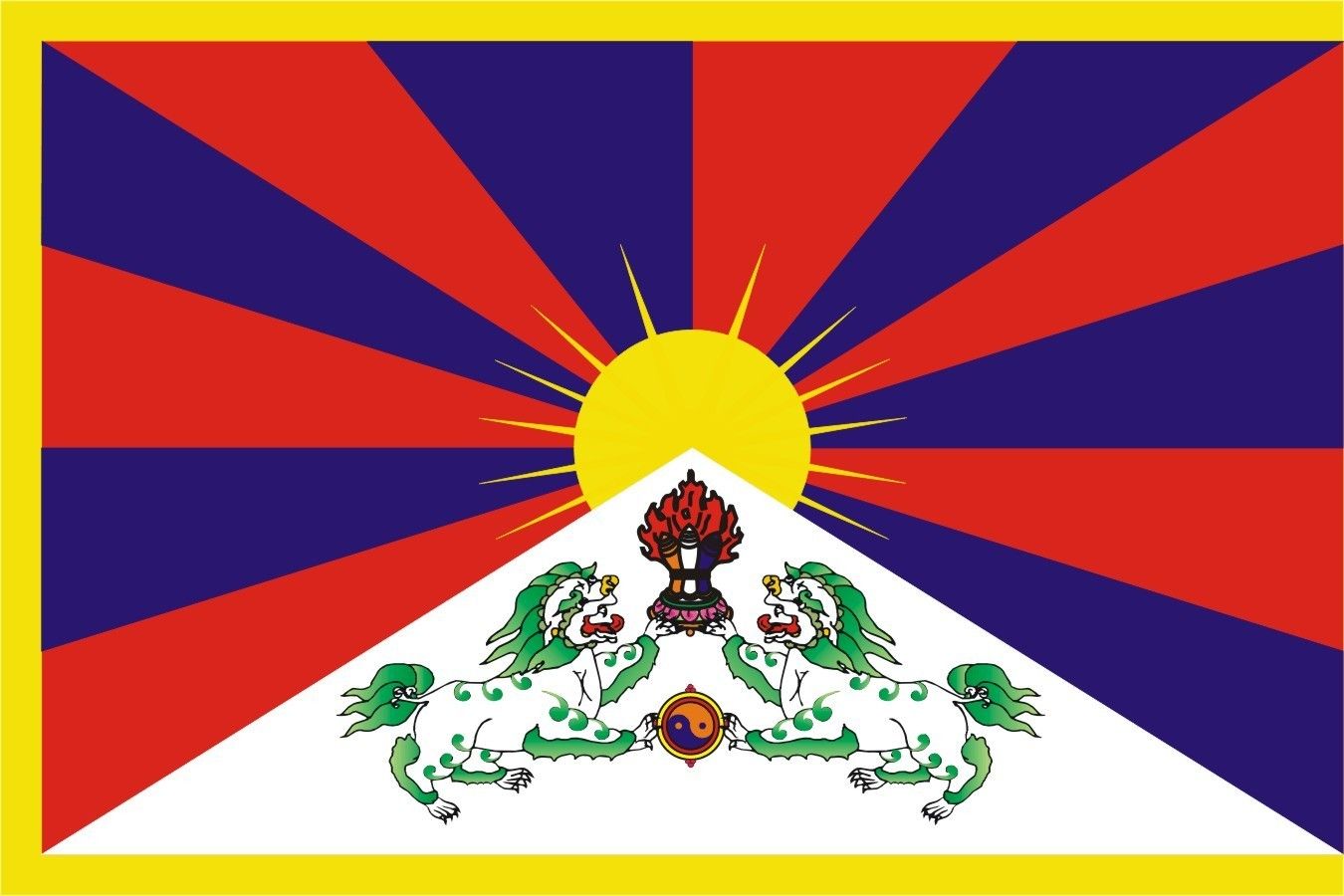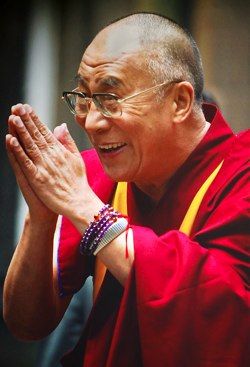“There are forms of idealism which may not be realized, but that doesn’t mean they aren’t functional and important.”

Two conversations, actually. I was honored to interview two of the founders of Tibet House US, for a story about their 20th benefit concert.
Robert Thurman is a professor (and a dad), and Philip Glass you know. They, along with Richard Gere, started the New York Tibet House in 1987 — there are others around the world — “to ensure the survival of Tibetan civilization and culture, whatever the political destiny of the six million people of Tibet itself.”
So from the beginning it had a cultural mission, but with a fraught political context. Tibet was invaded by Mao’s Communist forces in 1950, and the Dalai Lama has been in exile since 1959. Today Tibet is still a forbidden word in China — it symbolizes the ugly truth about authoritarian rule, which can’t be erased by free trade and tourism.
Both Thurman and Glass indulged me with long, thoughtful conversations that couldn’t be summarized in an 800-word article. They have revealingly different perspectives. Thurman believes that political reconciliation with China is inevitable; Glass, less sanguine on that point, is interested in how a refugee culture survives, and the effect it has on the rest of us. (“What we’ve gotten good at as human beings is surviving outside of places where these things began,” he says. “It’s maybe not ideal, but it’s actually what really happens.”)
Here are excerpts from these conversations, which took place separately at Tibet House in Manhattan on Feb. 22, 2010.
1. Thurman
Two decades in, how do you see the success of Tibet House as an organization? Things have not gone so well for Tibet in that time.
I know, yes. People say that the fame and the popularity of the Dalai Lama haven’t helped Tibet, because China is still oppressing Tibet, and they’re still doing basically ethnocide — trying to absorb and assimilate the Tibetan people into the Chinese people. So they say, What’s the point?
But we don’t feel that’s an accurate analysis. People often say that this nonviolent approach, hoping for dialogue with an oppressive colonial invading power, and preserving culture, appealing to positive causes, even appealing to Chinese positive side — is pointless, that you have to actually fight for independence. Even some young Tibetans say that. On the other hand we would point to Afghanistan and the Palestinian situation, and many others around the planet where violence has not helped in 30 years or 40 years — or 50 years, actually. Although the Tibetans periodically resist, they are oppressed daily. Many have been imprisoned. Over 1 million have been killed. Tons of their cultural treasures and monuments have been destroyed. There are still 6 million Tibetans alive in Tibet and they are somehow surviving. It takes long time to get a dictatorship to change its behavior, but it is changing. And the Tibetan culture is quite popular underground in China. The Chinese people have been oppressed themselves for 60 years, since Mao. If they do another violent revolution like Mao led, that wouldn’t necessarily get them a better situation.
On the other hand we would point to Afghanistan and the Palestinian situation, and many others around the planet where violence has not helped in 30 years or 40 years — or 50 years, actually. Although the Tibetans periodically resist, they are oppressed daily. Many have been imprisoned. Over 1 million have been killed. Tons of their cultural treasures and monuments have been destroyed. There are still 6 million Tibetans alive in Tibet and they are somehow surviving. It takes long time to get a dictatorship to change its behavior, but it is changing. And the Tibetan culture is quite popular underground in China. The Chinese people have been oppressed themselves for 60 years, since Mao. If they do another violent revolution like Mao led, that wouldn’t necessarily get them a better situation.
So in other words nonviolent change is something the world not used to. And change by preserving culture and cultivating people’s positive attitude, people are not used to. But we feel it is quite successful. The people of the world, most of them know about Tibet. They care about Tibet. Even many people in China know and care about Tibet. So it’s a matter of time before the world system changes, where the governments will actually have to listen to their own people, which they still are not doing. They are basically militarists, most of them, corporate-driven. And democracies are not working well — look at ours. The world is being pushed to its own limit.
I like to think since James Cameron’s brilliant work that the Tibetans are like the Na’vi. They’re hanging in there. Maybe not fighting with bows and arrows, but they still are staying connected to nature, and we think they will prevail.
Is the political situation in Tibet discouraging?
Sure, it’s discouraging for everybody. But the one thing I find encouraging is that the oligarchies controlling all the different countries and running the planet into the ground for money are so incompetent. They keep screwing up! It’s so wasteful. Their banks are crashing, their wars are failing — everything is going wrong for them. The fact that they’re acting so desperately and so irrationally I find encouraging, because it seems they somehow sense that beneath the goose-stepping and marching around that they are losing their hold. Like China for example, trying to be popular by doing the Olympics and then goose-stepping around, arresting old ladies who protest their houses being bulldozed, and running around the planet frantically trying to prevent anybody from having tea with the Dalai Lama — supposedly super-powerful guys afraid of a little monk who cracks jokes and wanders around in sandals in the snow. Come on. It’s so silly.
But last week when Obama met with the Dalai Lama, they still kept it semiprivate, and whisked him out a back door by the garbage.
People make a lot of that, but the only reason the garbage was there is that they had a snowstorm in Washington that they don’t know how to deal with. I don’t think people should get overly worked up about that. I’m sure the Dalai Lama himself would have urged Obama, don’t rile them up too much, you don’t have to make a big fuss. People around the Dalai Lama can make a fuss and say he was treated with indignity and blah blah blah. But the Dalai Lama doesn’t care. Look at him, wearing sandals with a big grin on his face.
The point is, he’s not into confrontation. Years ago the Dalai Lama refused to go into the UN, a building he’d been dying to visit for many years, because he loves that kind of thing. But he refused to go with the late Jeane Kirkpatrick, who was known as a super right-winger neo-con, because he didn’t want the Chinese to be able to shout and scream that he was a neo-con himself. He never asked to condition most-favored-nation status. He never challenged their right to hold the Olympics. He tries to be super-conciliatory. He’s happy to go in and out of back doors.
He was glad to meet Obama. I know he had met him before as a senator, and it is important that he does meet him and that China fails in their efforts to prevent him from meeting heads of state. Because that’s how he keeps alive the awareness of Tibet. But he doesn’t want to do it that confrontationally. He wants to give the Chinese face-saving things, and he wants them to relent. Because after all they are the ones who are paranoid about him, and they are the ones who have never met him. If they met him they would calm down. They would stop being so freaked out. They might feel a little guilty and penitent about some of their bad behavior, because you do in the presence of a person like that. But they would relax. Unfortunately their system is such that they are scared to meet him, and they never do.
You wrote a piece for the Huffington Post last week saying that “the Dalai Lama wants Tibet to be a fully contributing part of China,” that the Chinese are wrong to accuse him of wanting to split Tibet away. But why doesn’t he? This is the force that has occupied his country for decades, killed thousands of his countrymen. Some of them have done that. The head of the secret police; Hu Jintao is himself very guilty of harshness and violence and murder when he was there, and is condoning it even today. A guy named Changchun Li who is in charge, is a complete thug, a Communist party boss.
Some of them have done that. The head of the secret police; Hu Jintao is himself very guilty of harshness and violence and murder when he was there, and is condoning it even today. A guy named Changchun Li who is in charge, is a complete thug, a Communist party boss.
So yes, the Dalai Lama acknowledges that everyone in the world likes to be free. The Tibetans are famous for their complete individualism, being semi-nomadic people living at high altitudes, wandering in their tents. But the Dalai Lama says to his people — and I think he’s correct — that at this stage, the way Tibet has been handled, it is better for Tibet to be affiliated with one of the big powers. Especially because that power has de facto been in control of it, has a lot of people there, has a lot of military there, and has done a lot of damage — and has the means to repair that damage should they turn their policy around. That means it would function better for the benefit of China in a federation, as China pretends that it is in federation with what it calls its minority nationalities.
Furthermore, the Dalai Lama is fully aware that the Tibetans can relate positively to the Chinese. They have been a helpful neighbor to the Chinese in past centuries. They have ameliorated the harsh control by Mongolians and Manchurians when they conquered China, and got them to treat the Chinese more nicely. The Tibetans are Buddhist masters, and the Chinese like Buddhism. There are hundreds of millions of Chinese Buddhists. The Chinese desperately need spirituality.
The Dalai Lama is aware that if the Chinese continue in their neo-colonial and neo-imperial behavior with Russia, with India, with Central Asian Islamic republics and their own Muslims, then there will be so much violence going in Asia that even a free Tibet would be overrun with nuclear war. Imagine the millions of Chinese Buddhists who would appreciate teachings from the Dalai Lama. Westerners come in the tens of thousands nowadays, but the Chinese would come in the hundreds of thousands. And they would benefit from the Dalai Lama’s representations and his walking the talk of Buddhist ethics. So as a peacemaker and as a religious leader he likes to have a hand in China. And it would be a tremendous help to the reawakening of China as a spiritual entity, which they desperately need, because their greedy consumption of the world’s resources and their overproduction of crappy goods, etc., for consumers is part of the planetary destruction.
To change China into a cooperative 21st-century power, and get it out of imitating the 19th-century behavior of Britain and the 20th-century behavior of the U.S., is a really important thing. The Tibetan people can be of more help from within China than they can as some kind of bereft, isolated, autonomous and wrecked, devastated place. So the Dalai Lama is politically and socially and historically deeply insightful. But it’s hard for people to recognize it because they think of powerful people as having tanks and planes and bombs. Those he doesn’t have and will never have. [Laughs.]
2. Glass
How did you first get interested in Tibet?
Totally by accident. I went to India in 1966. I had just been working with Ravi Shankar in Paris. I got interested in his music, and I was interested in some of the teachers there. I was up in northern India and I saw a refugee camp. And I said, “What’s this?” I didn’t know. They said, “It’s a Tibetan refugee camp.” I said, “What are they doing there?” I missed that bit of news. It had only happened a few years before, and many of us didn’t know about it.
I began meeting people there, and when I came back to New York I wanted to know more about it. I met the Dalai Lama’s representative in New York at that time, and I just got to know people. At the time there were three Tibetans living in New York; I knew the whole Tibetan population. Very soon other people came and then I began going back. At that time I was going down to Freehold, N.J. That’s where Bob Thurman and a number of these guys were studying Tibetan. The first wave of translators were studying in Freehold, N.J., not with a Tibetan guy but a Mongolian guy, Geshe Wangyal. He was teacher for a lot of these people. These were the really early days. It was really quite a few years later, in 1987, that we started Tibet House.
It started very small. It’s astonishing how it’s grown. I was at the Rubin yesterday giving a talk. I was at bookstore, and you look at that books that are published. I can’t even find the old books anymore. It used to be that there were only about eight books on Tibet, and I had them all. Now there are 800 or something like that. It’s a measure of how attractive this culture and these people have been to Americans that it has grown and taken root so widely.
How successful has Tibet House been with its mission over the last 20 years?
It’s changed over time. When we began, the refugee community was not nearly as well established as they are now. You had men who had spent their lives studying religious texts wrapping packages at Macy’s, and stuff like that. You had these very disproportionate things where people of great education and stature were starting at entry-level jobs that were way beneath them. You have to remember also that most people didn’t know where Tibet was, let alone that it had been invaded.
We began Tibet House at the request of the Dalai Lama. His idea was to have these cultural centers that would keep alive and make people aware of the authentic and independent culture. I’m not talking about the politics, just the culture. We’re talking about a country with its own language, its own history, the whole thing. So Tibet House as a whole has been functioning in that way. Now we have been upstaged in a wonderful and a magnificent way by the Rubin Museum. I love that museum. [Laughs.]
We’re a rather small place, but we go public very big at the concerts. And that has been helpful to make people aware of Tibet House as an institution, and what the mission of Tibet House is. And as I say, that has changed. Over the years the Tibetan community has been very successful in getting integrated economically in America. Now we have a generation of Tibetan kids who were born here. They have Tibetan summer camps, just the way all the immigrant communities have maintained their identities, whether they’re Italian, or ... I was going to say Jewish, but it’s hard to say what the Jews were, a country or a tribe. You know, we talk about doctors without borders — we’re talking about a country without borders, until recently. [Laughs.]
As this has evolved people have become more aware. The Dalai Lama getting the Nobel Peace Prize and becoming truly an international person, someone that people acknowledge in a spiritual and ethical and moral way as a world leader. You have to go back to Martin Luther King and Gandhi to find a person of that stature in the world. And as his stature has increased, so the visibility and credibility of an independent culture has grown. We began as a kind of beacon: “Here we are, don’t forget us!” Now it’s become like a celebration of a culture which is surviving in a way no one expected it would.
Do you think people in America view the Dalai Lama and the Tibetan cause as a losing battle?
I don’t think so. A losing battle politically, geographically, perhaps. But culturally, no.
Those are important, though, the political and geographical sides of it.
It’s one slice of it. But don’t forget, in this country we have all kinds of refugee cultures that come here. The Jewish people came here, the Armenians came here, the Ukrainians came here. All these cultures that had to leave. We have a big history of that.
But isn’t the whole thing with Tibet about exile and the hope to return?
Of course. And you go to a Passover thing, they’re still talking about returning. We’re talking 2,000 years. That doesn’t mean it’s going to happen; it also doesn’t mean it isn’t important. There are forms of idealism which may not be realized, but that doesn’t mean they aren’t functional and important. The idea of return is also a way of hanging on to a cultural history. In other words I don’t take it literally. But I’m not Tibetan and I don’t have to. And I think many people don’t actually expect it to literally happen. But what we’re talking about is the survival of a culture, the survival of a lineage of teaching, the survival of a music and an art and a language, and all the things a culture entails. What we’ve gotten good at as human beings is surviving outside of places where these things began. It’s maybe not ideal, but it’s actually what really happens.
The benefits of a refugee culture have been tremendous. It’s had a big impact on America. When the Tibetans left Tibet they took with them an ageless culture. Not ageless exactly, but they had preserved in the Himalayas in a pure form things that had been lost in other countries, and they brought it here. And the benefit in this country is tremendous. How do we look at it as Americans? It might be a slightly cruel thing to say, but we’ve been the beneficiaries of an exiled community, as we have been with the Italians, and with the Ukrainians, or the Jewish people, or the African cultures that came here through slavery. America is a very dynamic and vital place and partly because of our ability to absorb these kinds of things.
In a way you could say I’m begging the question. But this is a question worth begging, because the answer is what we know about. It’s what we’re actually living with. We can talk about going back to Tibet some day, but what we’re really dealing with is the benefits of learning from a culture which no one would ever have even known about.
Ancient history: Tom Waits, Roberto Benigni, Thurston Moore, Al Green, Lou Reed, M.I.A.



No comments:
Post a Comment